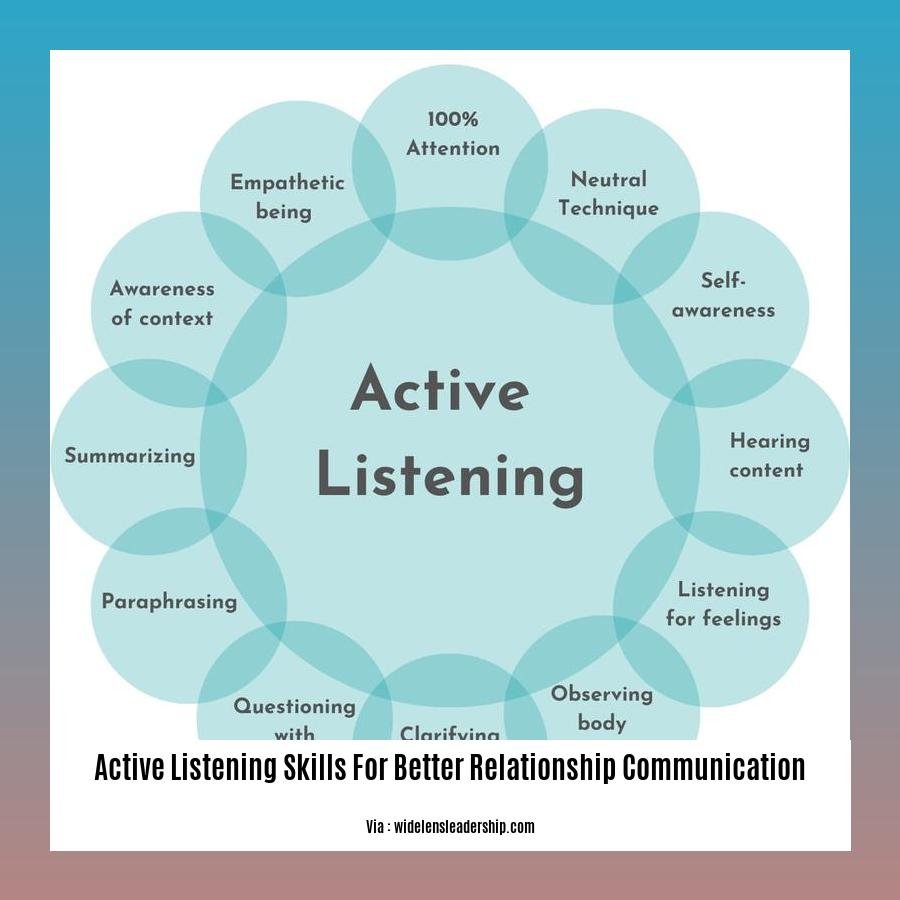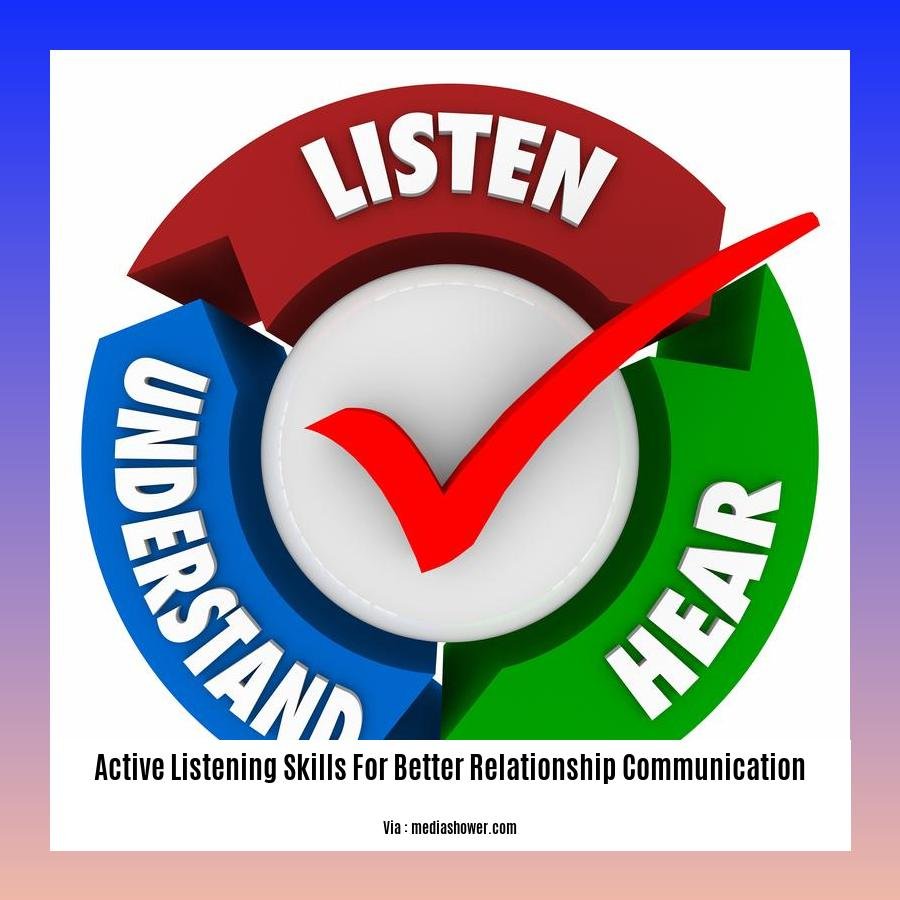Embark on a journey to unlock the transformative power of active listening in relationships through this comprehensive guide. Discover the barriers that hinder effective communication, the profound benefits of engaged listening, and practical techniques to enhance your listening skills. This article, [Active Listening Skills for Better Relationship Communication], will equip you with the knowledge and strategies to foster open dialogue, deepen connections, and build stronger, more fulfilling relationships.
Key Takeaways:

- Listen attentively to verbal and nonverbal cues.
- Summarize and repeat back what you hear to ensure understanding.
- Encourage the other person to share their feelings.
- Stay focused on the other person’s perspective.
- Collaborate on finding solutions or providing support.
Active Listening Skills for Better Relationship Communication
Mastering the Art of Active Listening:
Effective communication is the cornerstone of fulfilling relationships. Active listening skills enable you to connect deeply, build trust, and foster understanding. Here’s a practical guide to enhance your ability to listen attentively and foster meaningful connections.
Tips for Active Listening:
-
Be Fully Present: Engage fully in the conversation, giving the speaker your undivided attention. Tune into their words, but also pay heed to their body language and tone of voice.
-
Reflect and Summarize: After the speaker has shared their thoughts, take a moment to summarize their main points. This demonstrates that you’re listening attentively and that you understand their perspective.
-
Ask Open-Ended Questions: Encourage the speaker to elaborate by asking questions that cannot be answered with a simple yes or no. This helps delve deeper into their thoughts and feelings.
-
Empathize and Validate: Show that you understand their emotions by relating to their experiences. This creates a safe and supportive space for open communication.
-
Avoid Judgment: It’s crucial to listen without interrupting or making assumptions. Allow the speaker to fully express themselves without feeling judged.
Benefits of Active Listening:
-
Build Trust: Active listening shows others that you value their thoughts and feelings, nurturing trust and respect.
-
Resolve Conflicts Effectively: When you truly listen, you gain a better understanding of the other person’s point of view, making it easier to find common ground.
-
Strengthen Relationships: Listening attentively demonstrates care and support, tightening the bonds between individuals.
-
Improve Problem-Solving: Active listening helps identify and understand the root cause of problems, facilitating creative solutions.
-
Foster Emotional Intelligence: By listening to others, you develop a greater awareness of your own emotions and the emotions of others.
Remember, active listening skills are not just for conversations but for all forms of communication. Whether it’s over the phone, through text, or during a presentation, practicing attentive listening can transform your relationships for the better.
Uncover how to be an engaged listener to improve your romantic partnership and discover effective active listening strategies to make your partner feel heard. Enhance your communication by implementing techniques for empathetic listening to enhance intimacy and foster a deeper bond with your significant other.
7 Active Listening Techniques
Strengthening relationships and fostering meaningful connections requires effective communication, and active listening is paramount. Here’s your guide to enhance your active listening skills:
Focus on Intent
Intent is crucial. Pay attention to the speaker’s purpose and avoid interrupting or making assumptions. Your focus should be on understanding their perspective, not just their words.
Nonverbal Cues
Body language reveals hidden meanings. Observe facial expressions, eye contact, posture, and gestures. They convey emotions, intentions, and unspoken thoughts that complement verbal cues.
Encourage with Cues
Verbal cues, such as “I see,” “I understand,” or a nod, convey your engagement. These affirmations let the speaker know you’re following their thoughts and encourage them to continue.
Clarify and Paraphrase
Summarize or repeat key points in your own words to ensure comprehension. Ask clarifying questions and use phrases like “Can you explain that further?” or “What do you mean by…?” This shows you’re actively listening and seeking a deeper understanding.
Empathetic Inquiries
Asking questions elicits feelings and perspectives. Instead of making judgments, ask, “How do you feel about…?” or “What’s your take on this?” This fosters empathy and encourages open dialogue.
Eliminate Judgment
Listen without biases or preconceptions. Avoid jumping to conclusions or interrupting. Let the speaker express their thoughts freely without judgment, creating a safe and supportive environment.
Summarize, Share, Reflect
End the conversation by summarizing key points, sharing your perspective, and reflecting on the discussion. This reinforces understanding, shows you’ve listened, and provides opportunities for deeper connection.
Key Takeaways:
- Prioritize understanding the speaker’s intent and purpose.
- Observe nonverbal cues to enhance comprehension.
- Utilize verbal affirmations to encourage the speaker.
- Clarify and paraphrase to ensure understanding.
- Ask empathetic questions to elicit feelings and perspectives.
- Listen without judgment to create a supportive environment.
- Summarize, share, and reflect to reinforce understanding.
Relevant URL Source:
Why Active Listening Is Important
Key Takeaways:
- It enables true engagement and inclusivity.
- It fosters healthy, enduring relationships, both personal and professional.
- It prevents misunderstandings, conflicts, and hurt feelings.
- It promotes empathy and compassion.
- It enhances problem-solving and decision-making.
There’s a reason why we have two ears and only one mouth. Why Active Listening Is Important is a question that we all should ponder upon to enhance our communication skills and have meaningful relationships in life. It encourages us to fully process and comprehend what others have to say, fostering deeper connections and understanding.
Active listening is an essential skill in all facets of life, including personal relationships, workplace collaborations, and civic discourse. When we practice active listening, we show others that we value their thoughts and feelings. This not only builds trust but also opens doors for more productive and fulfilling interactions.
The benefits of active listening extend beyond interpersonal relationships. In the workplace, it leads to improved teamwork, increased productivity, and a positive work environment. Active listeners are often sought out as trusted colleagues and valued members of any team.
Steps to Enhance Active Listening Skills:
1. Maintain Focus:
– Pay undivided attention to the speaker.
– Avoid distractions like phones or side conversations.
2. Observe Body Language:
– Nonverbal cues often convey more than words.
– Note facial expressions, posture, and gestures.
3. Ask Clarifying Questions:
– Show that you’re listening by asking questions for better understanding.
– This also encourages the speaker to elaborate and share more.
4. Avoid Judgment and Interruptions:
– Focus on listening without prejudice or preconceived notions.
– Allow the speaker to finish their thoughts before responding.
5. Summarize and Reflect:
– To ensure understanding, paraphrase what you’ve heard.
– Reflect on the emotional content of the message and respond empathetically.
Remember, active listening is a skill that requires practice and dedication. By implementing these techniques, you can improve your communication skills, strengthen your relationships, and become a more effective communicator overall.
Source

FAQ
Q1: What are some common barriers to active listening in relationships?
A1: Barriers to active listening in relationships can include distractions, prejudgments, interrupting, and a lack of empathy.
Q2: What are the benefits of active listening in relationships?
A2: Active listening fosters deeper connections, strengthens intimacy, and improves conflict resolution skills in relationships.
Q3: Can you mention some active listening techniques?
A3: Active listening techniques include maintaining eye contact, reflecting back what you hear, asking clarifying questions, and seeking to understand rather than respond.
Q4: Why is active listening important in relationships?
A4: Active listening is important in relationships because it promotes open and honest communication, builds trust, and enhances emotional connection between partners.
Q5: How can active listening help prevent conflicts in relationships?
A5: Active listening can help prevent conflicts in relationships by allowing individuals to fully understand each other’s perspectives, empathize with each other’s feelings, and work together to find mutually acceptable solutions.










